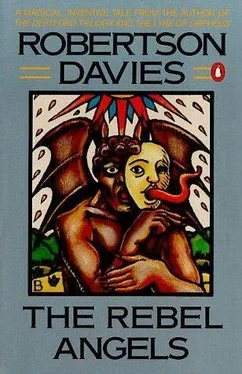Robertson Davies - The Rebel Angels
Здесь есть возможность читать онлайн «Robertson Davies - The Rebel Angels» весь текст электронной книги совершенно бесплатно (целиком полную версию без сокращений). В некоторых случаях можно слушать аудио, скачать через торрент в формате fb2 и присутствует краткое содержание. Жанр: Триллер, на английском языке. Описание произведения, (предисловие) а так же отзывы посетителей доступны на портале библиотеки ЛибКат.
- Название:The Rebel Angels
- Автор:
- Жанр:
- Год:неизвестен
- ISBN:нет данных
- Рейтинг книги:5 / 5. Голосов: 1
-
Избранное:Добавить в избранное
- Отзывы:
-
Ваша оценка:
- 100
- 1
- 2
- 3
- 4
- 5
The Rebel Angels: краткое содержание, описание и аннотация
Предлагаем к чтению аннотацию, описание, краткое содержание или предисловие (зависит от того, что написал сам автор книги «The Rebel Angels»). Если вы не нашли необходимую информацию о книге — напишите в комментариях, мы постараемся отыскать её.
The Rebel Angels — читать онлайн бесплатно полную книгу (весь текст) целиком
Ниже представлен текст книги, разбитый по страницам. Система сохранения места последней прочитанной страницы, позволяет с удобством читать онлайн бесплатно книгу «The Rebel Angels», без необходимости каждый раз заново искать на чём Вы остановились. Поставьте закладку, и сможете в любой момент перейти на страницу, на которой закончили чтение.
Интервал:
Закладка:
Brown's speech was reported spottily but sufficiently. I had met Murray Brown a few times during my years as a parish clergyman, before I became an academic. He was an angry man, who had turned his anger into a crusade on behalf of the poor. Thinking of the wrongs of the underprivileged, Murray Brown could become deliciously furious, say all kinds of intemperate things, attribute mean motives to anyone who disagreed with him, and dismiss as unimportant anything he did not understand. He was detested by conservatives, and he embarrassed liberals because he was a man without intellectual scope and without fixed aims, but he was popular with enough like-minded people to get himself elected to the Provincial Legislature over and over again. He always had some hot cause or other, some iniquity to expose, and he had turned his attention to the University. In his intellectually primitive way he was an able controversialist. Are we paying good money to keep fellows playing with shit and girls talking horny nonsense in classrooms? Of course we needed doctors and nurses and engineers; maybe we even needed lawyers. We needed some economists and we needed teachers. But did we need a lot of frills? Murray's audience was sure that we did not.
Would Murray think me a frill? Indeed he would. I was a soldier who had deserted his post. Murray's notion of a clergyman was somebody who worked among the poor, not as efficiently, perhaps, as a trained social worker, but doing his best and doing it cheap. I don't suppose that the notion of religion as a mode of thought and feeling that could consume the best intellectual efforts of an able man ever entered Murray's head. But I had done my whack as the kind of parson Murray understood, and had turned to university teaching because I had become convinced, in some words Einstein was fond of, that the serious research scholar in our generally materialistic age is the only deeply religious human being. Having discovered how hard it is to save the souls of others (did I ever, in my nine years of parish work among both poor and not-so-poor, really save anybody's soul?) I wanted to give all the time I could spare to saving my own soul, and I wanted to do work that gave me a little time for that greater work. Murray would call me selfish. But am I? I am hard at the great task with the person who lies nearest and who is most amenable to my best efforts, and perhaps by example I may persuade a few others to do the same.
Oh, endless task! One begins with no knowledge except that what one is doing is probably wrong, and that the right path is heavy with mist. When I was a hopeful youth I set myself to the Imitation of Christ, and like a fool I supposed that I must try to be like Christ in every possible detail, adjure people to do the right when I didn't really know what the right was, and get myself spurned and scourged as frequently as possible. Crucifixion was not a modern method of social betterment, but at least I could push for psychological crucifixion, and I did, and hung on my cross until it began to dawn on me that I was a social nuisance, and not a bit like Christ – even the tedious détraqué Christ of my immature imagination.
Little by little some rough parish work showed me what a fool I was, and I became a Muscular Christian; I was a great worker in men's clubs, and boys' clubs, and I said loudly that Works were what counted and that Faith could be expected to blossom in gymnasiums and craft classes. And perhaps it does, for some people, but it didn't for me.
Gradually it came to me that the Imitation of Christ might not be a road-company performance of Christ's Passion, with me as a pitifully badly cast actor in the principal role. Perhaps what was imitable about Christ was his firm acceptance of his destiny, and his adherence to it even when it led to shameful death. It was the wholeness of Christ that had illuminated so many millions of lives, and it was my job to seek and make manifest the wholeness of Simon Darcourt.
Not Professor the Reverend Simon Darcourt, though that splendidly titled figure had to be given his due, because the University paid him to be both reverend and a professor. The priest and the professor would function suitably if Simon Darcourt, the whole of him, lived in a serious awareness of what he was and spoke to the rest of the world from that awareness, as a priest and a professor and always as a man who was humble before God but not necessarily humble before his fellows.
This was the real Imitation of Christ, and if Thomas à Kempis didn't like it, it was because Thomas à Kempis wasn't Simon Darcourt. But old Thomas could be a friend. "If you cannot mould yourself as you would wish, how can you expect other people to be entirely to your liking?" he asked. You can't, of course. But I had decided that the strenuous moulding of my earlier days, the prayers and austerities (there had been a short time when I went in for peas in my shoes and even flirted with a scourge, till my mother found it) and playing the Stupid Ass when I thought I was being the Suffering Servant, was nonsense. I had given up moulding myself externally and was patiently waiting to be moulded from within by my destiny.
Patiently waiting! In my soul, perhaps, but the University does not pay people for patient waiting, and I had my classes to teach, my theologues to push towards ordination, and a muddle of committees and professional university groups to attend to. I was a busy academic, but I found time for what I hoped was spiritual growth.
My greatest handicap, I discovered, was a sense of humour. If Urquhart McVarish's humour was irresponsibility and contempt for the rest of mankind, mine was a leaning towards topsy-turveydom, likely to stand things on their heads at inopportune moments. As a professor in a theological faculty I have some priestly duties and at Spook we are ritualists. I am in entire agreement with that. What did Yeats say? "How else but in custom and ceremony are innocence and beauty born?" But just when custom and ceremony should most incline me towards worship, I may have to contend with a fit of the giggles. Was that what ailed Lewis Carroll, I wonder? Religion and mathematics, two realms in which humour seems to be wholly out of place, drove him to write the Alice books. Christianity has no place for topsy-turveydom, little tolerance of humour. People have tried to assure me that St. Francis was rich in humour, but I don't believe it. He was merry, perhaps, but that is something else. And there have been moments when I have wondered if St. Francis were not just the tiniest bit off his nut. Didn't eat enough, which is not necessarily a path to holiness. How many visions of Eternity have been born of low blood-sugar? (This as I prepare a third piece of toast thickly spread with honey.) Indeed some measure of what might be called cynicism, but which could also be clarity of vision, tempered with charity, is an element in the Simon Darcourt I am trying to discover and set free. It was that which made it impossible for me not to take note that Urky McVarish's picture of Sir Thomas Urquhart, looking so strikingly like himself, had been touched up to give precisely that impression. The green coat, the hair (a wig), and most of the face were original, but there had been some helpful work on the resemblance. When you looked at the picture sideways, under the light that shone so strongly on it, the over-painting could be plainly seen. I know a little about pictures.
Poor old Urky. I hadn't liked the way he pestered the Theotoky girl about virginity, and gentlewomen's thighs. I looked up the passage in my Rabelais in English: yes, the thighs were cool and moist because women were supposed to pee a bit at odd times (why, I wonder? they don't seem to do it now) and because the sun never shone there, and they were cooled by farts. Nasty old Rabelais and nasty old Urky! But Maria was not to be disconcerted. Good for her!
Читать дальшеИнтервал:
Закладка:
Похожие книги на «The Rebel Angels»
Представляем Вашему вниманию похожие книги на «The Rebel Angels» списком для выбора. Мы отобрали схожую по названию и смыслу литературу в надежде предоставить читателям больше вариантов отыскать новые, интересные, ещё непрочитанные произведения.
Обсуждение, отзывы о книге «The Rebel Angels» и просто собственные мнения читателей. Оставьте ваши комментарии, напишите, что Вы думаете о произведении, его смысле или главных героях. Укажите что конкретно понравилось, а что нет, и почему Вы так считаете.












